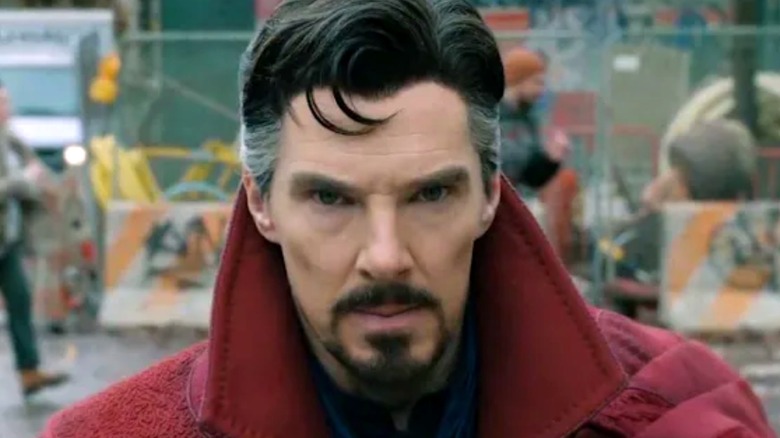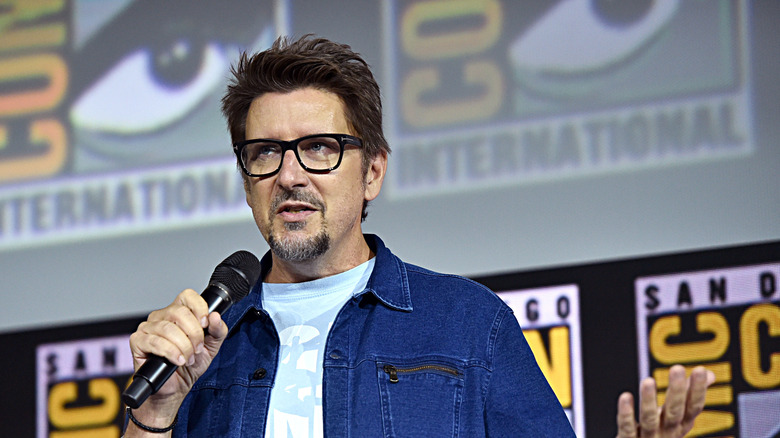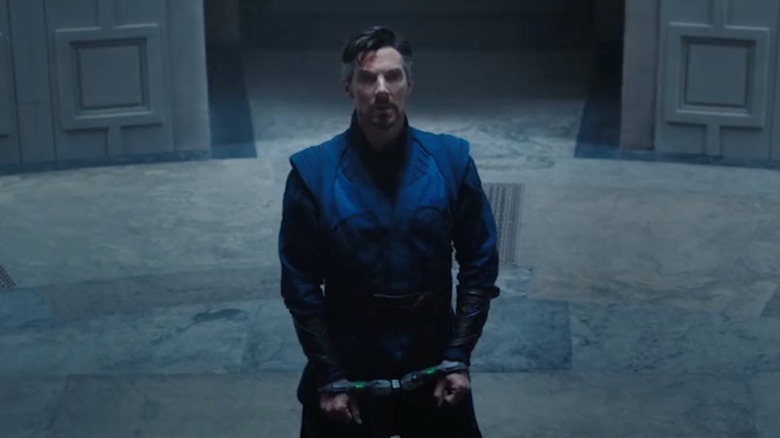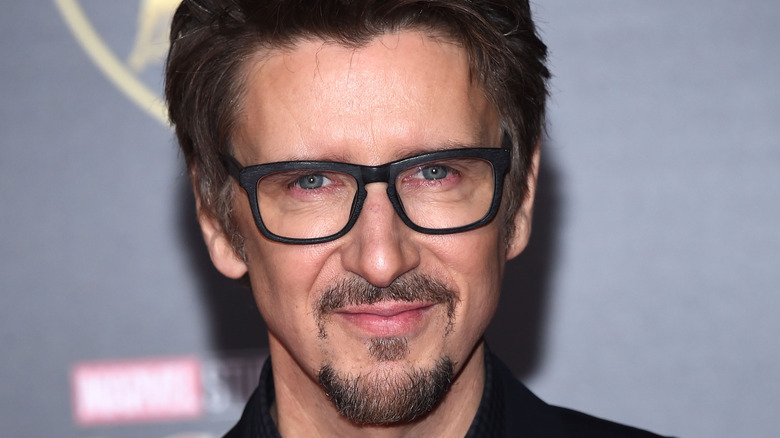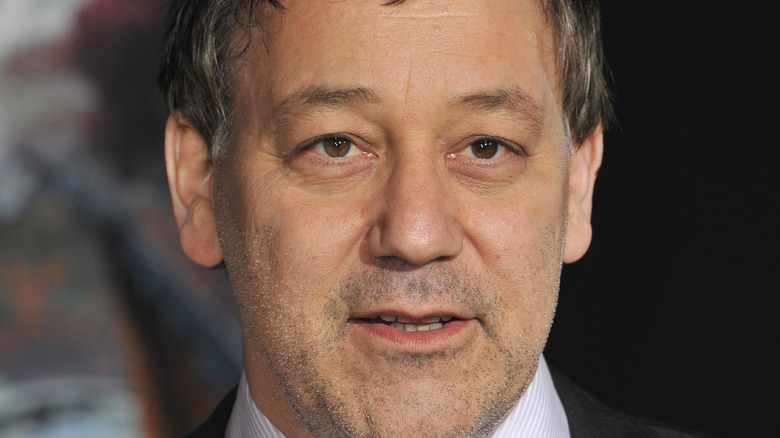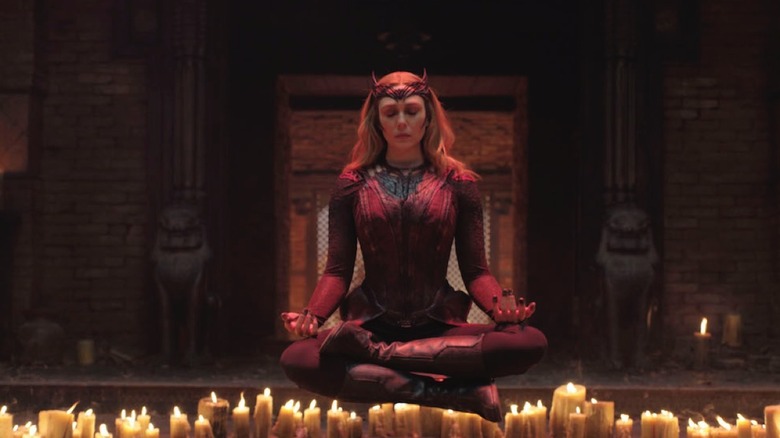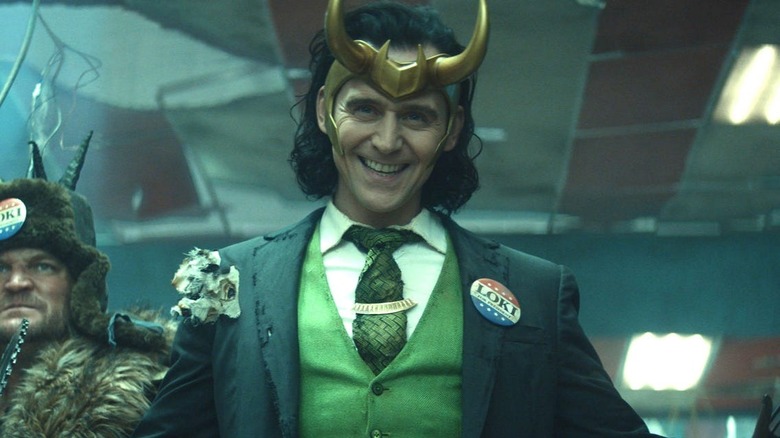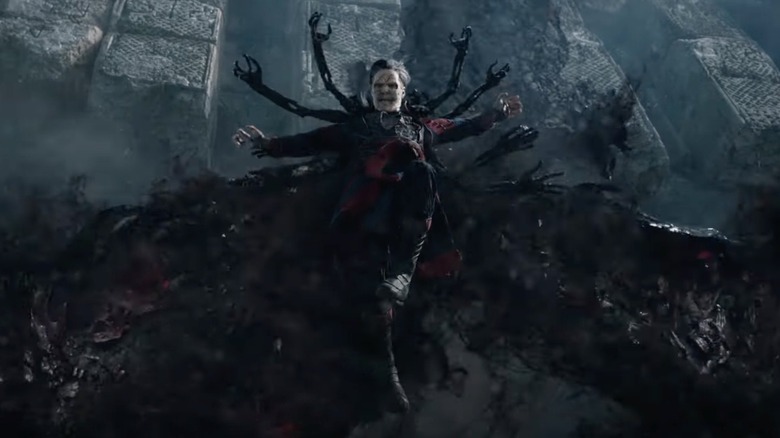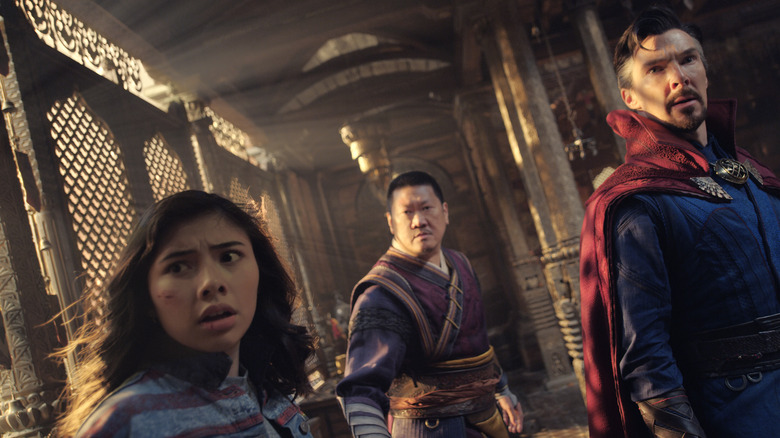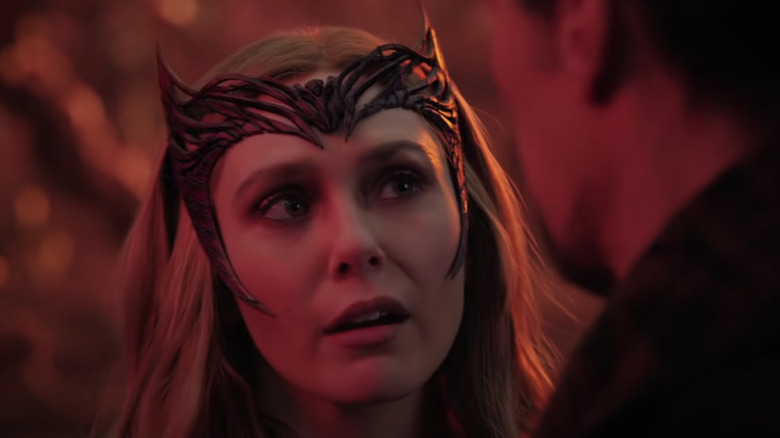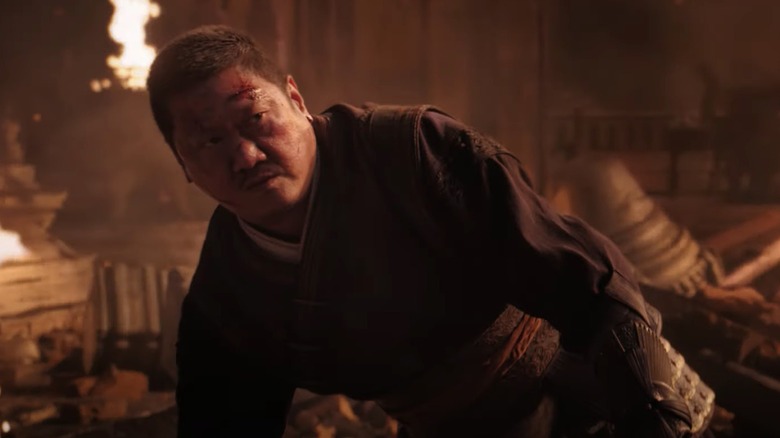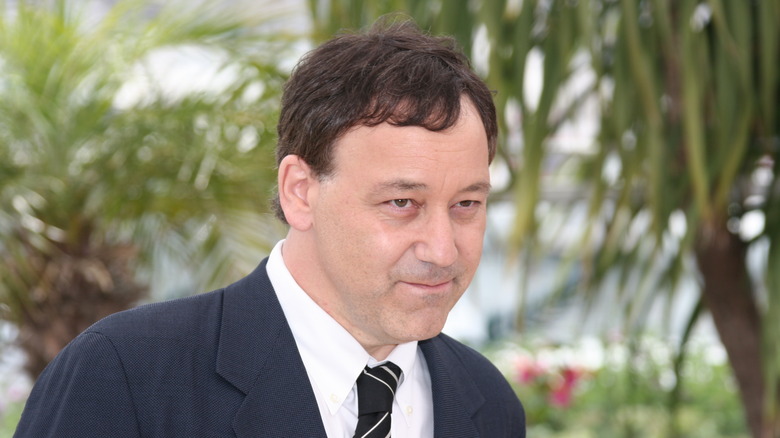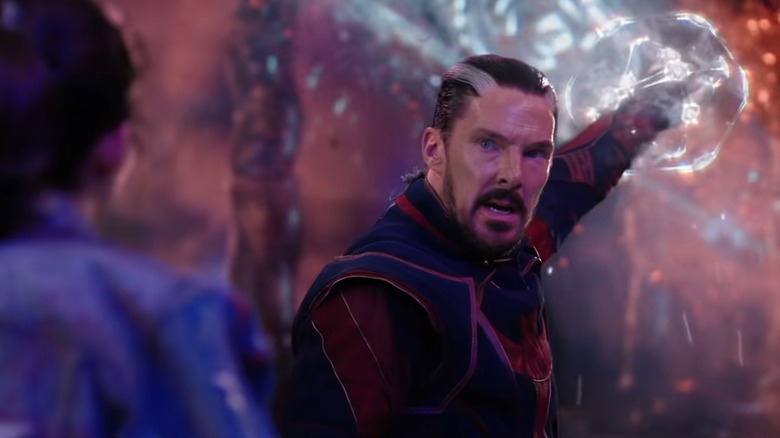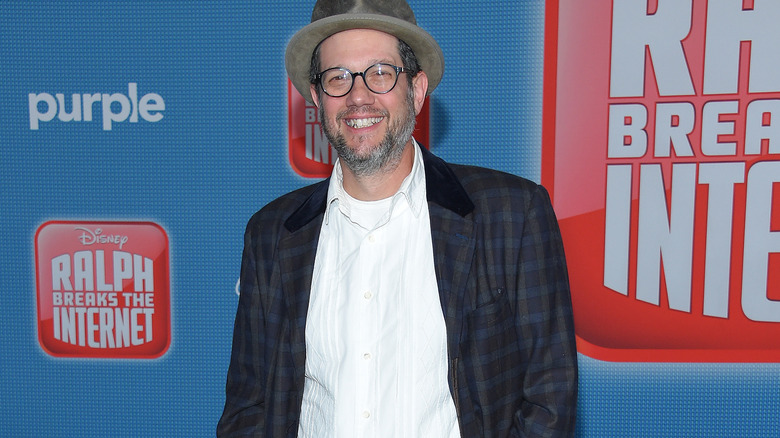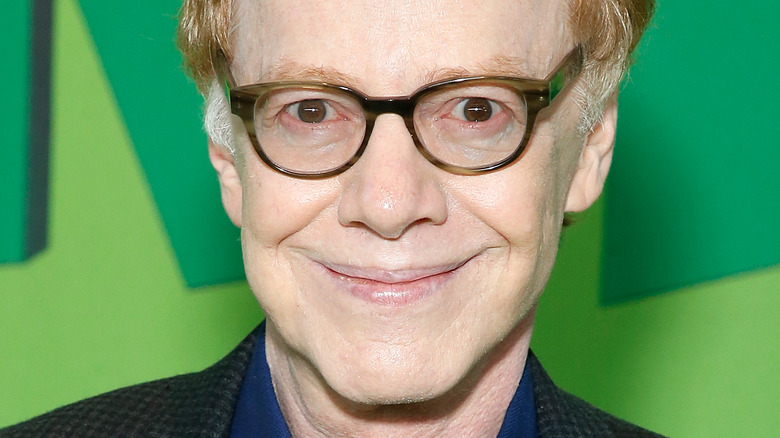The Untold Truth Of Doctor Strange In The Multiverse Of Madness
While it's taken several years for a proper "Doctor Strange" follow-up to emerge, the film's titular superhero has been busy thanks to appearances in movies across the Marvel Cinematic Universe, including two of the "Avengers" sequels and "Spider-Man: No Way Home." However, Doctor Strange returns to solo adventures with "Doctor Strange in the Multiverse of Madness," which sees him tangling with the expansive possibilities of the multiverse.
The film also sees director Sam Raimi returning to helm a superhero blockbuster for the first time after his work on the original "Spider-Man" trilogy. Meanwhile, Wanda Maximoff, aka the Scarlet Witch, makes her first appearance since the mind-bending adventures of "WandaVision." The fact that all of these exciting elements are a prominent part of "Multiverse of Madness" means that fans have plenty to enjoy in this major MCU installment.
However, there's still tons of behind-the-scenes information that isn't common knowledge concerning this highly-anticipated sequel. This includes the assorted release date delays, what led Raimi to return to directing superhero tentpoles, and even at the importance of Danny Elfman serving as the film's composer. Just as the multiverse offers countless surprises for Doctor Strange, the untold truth of "Doctor Strange in the Multiverse of Madness" offers oodles of exciting revelations for MCU fans.
Director Scott Derrickson's original Doctor Strange 2 ideas
When you're promoting a big comic book movie, people will inevitably ask you about the possibility of a sequel. This is especially true when you're hawking a new MCU title like "Doctor Strange." Even before the original arrived in movie theaters across the globe, director Scott Derrickson was fielding inquiries about what a potential sequel would look like. Talking to IGN, Derrickson said that he wanted to explore the Doctor Strange baddie Nightmare from the comics as well as the character's domain of the Nightmare Realm.
CinemaBlend reports that Derrickson had further comments on a possible "Doctor Strange" follow-up indicating a desire to take a cue from "The Dark Knight" in crafting a sequel that was deeper and "more visceral" than its predecessor. Once the project was officially announced, he would also constantly talk about his plans to make "Multiverse of Madness" a truly scary movie, while a comment on his Twitter indicated that he once talked to "Russian Doll" mastermind Natasha Lyonne about a possible role in the film.
Derrickson's eventual departure from "Multiverse of Madness" meant that he never got to realize his vision for a "Doctor Strange" sequel. However, it's clear that Derrickson had a concrete idea of where a sequel could go whenever the inevitable questions about its existence came up.
The official announcement of Multiverse of Madness
Among the barrage of big MCU announcements at the San Diego Comic-Con 2019 was the confirmation that a "Doctor Strange" sequel was a-go. The feature got a title in the form of "Doctor Strange in the Multiverse of Madness," as well as a May 7, 2021 release date. Producer Kevin Feige brought out director Scott Derrickson and star Benedict Cumberbatch to talk about the project, with the latter figure being greeted with a boisterous rendition of "Happy Birthday" since the panel was occurring on the actor's birthday.
Beyond timely celebrations, the panel also contained a handful of surface-level details about "Multiverse of Madness," including its aim to be more of a horror film than any previous MCU project. This is also where Feige revealed that Elizabeth Olsen would be coming back after "WandaVision" to reprise her role as the Scarlet Witch. There wasn't much else to talk about regarding "Multiverse of Madness" at this event, beyond Feige reaffirming in a jokey interaction with an audience member that it would be rated PG-13, not R. However, the splashy reveal of this production's existence was still a momentous occasion for fans of the Doctor Strange character.
The loss of Derrickson as a director
At the start of 2020, just months before "Doctor Strange in the Multiverse of Madness" was set to start filming, the production faced a significant setback when Variety announced that Scott Derrickson was departing the project. This was an especially massive development given that Derrickson had previously directed the original "Doctor Strange." He was deeply connected to this film, and there had been no prior indicators that he would be leaving the project. Despite this massively discouraging event, Marvel Studios made it clear that Derrickson's absence wouldn't postpone the planned May 2020 start date for "Multiverse of Madness."
In May 2021, Derrickson and his co-writer, C. Robert Cargill, would further clarify what had led them to leave "Multiverse of Madness," per CinemaBlend. It had all boiled down to Derrickson and Marvel Studios having clashing visions for what this "Doctor Strange" sequel should be. While initially hoping to muddle through the assignment, the prospect of making his horror movie passion project "The Black Phone" made him decide to pursue that production instead. Cargill made it clear on Twitter that he never wrote a screenplay for their vision of "Multiverse of Madness," a note that reinforces how little input the original "Doctor Strange" creators had on the new film.
The hiring of Sam Raimi
With director Scott Derrickson gone and a May 2020 start date looming, all eyes were on Marvel Studios to see who they would secure to take over directorial duties on "Doctor Strange in the Multiverse of Madness." With this kind of time crunch, it was easy to be pessimistic about the director they could rope in for the project. But in February 2020, a monumental surprise was dropped on Marvel fans when Variety revealed that Sam Raimi was in talks to take over directorial duties on "Multiverse of Madness."
It was a stunning development on multiple levels, particularly in how shocking it was to see Raimi return to superhero movies after his work on the original "Spider-Man" trilogy. Not only had he already dabbled in this subgenre and seemingly moved on, but his bad experiences on "Spider-Man 3" seemed to indicate that he was done with tackling these types of movies. The sight of Raimi signing on for a gargantuan tentpole was even more surprising given that, at that point, it had been seven years since his last directorial effort, "Oz the Great and Powerful."
However, Raimi would later explain to Collider that his affection for the Doctor Strange character, reflected in how he was name-dropped in a gag in "Spider-Man 2," made him opt to join "Multiverse of Madness." Derrickson may have flown the coop, but with Raimi taking over directorial duties, "Multiverse of Madness" had some new wind in its creative sails.
How the pandemic delays helped the Doctor Strange script come together
When Sam Raimi was initially hired to take over directorial duties for "Doctor Strange in the Multiverse of Madness," all signs indicated that the plan was for the original May 2020 start date for filming to remain. This MCU title had been set for a May 2021 debut, and Marvel Studios didn't look likely to budge on that front. However, there was an unforeseen issue in the form of the COVID-19 pandemic. Just a little over a month after Raimi's name first got attached to this blockbuster, all movies ceased filming. With a new director and a new writer, per The Hollywood Reporter, it looked like "Multiverse of Madness" would need to make a mad dash to hit its targeted release date. Now, a global health crisis rendered that May 2021 date an impossibility.
While a release date delay would be discouraging in other contexts, for the crew behind "Multiverse of Madness," it was a blessing. On the podcast "Friends From Work," screenwriter Michael Waldron recalled how the months of lockdown, where everyone involved was waiting for the go-ahead to start filming, allowed more time for the "Multiverse of Madness" screenplay to properly gel, via ComicsBook.com. Waldron and Raimi would spend countless hours speaking through video conference tools to break down the narrative of this film and hone its tone that would take cues from classic horror films. While being stuck without a fresh start date couldn't have been foreseen, the COVID-19 shutdown for "Multiverse of Madness" did have major advantages for the feature on a screenwriting level.
The impact of Disney+ shows on Multiverse of Madness
With the arrival of Phase Four of the Marvel Cinematic Universe, the television and film sides of this expansive saga are now more intertwined than ever before. In the case of "Doctor Strange in the Multiverse of Madness," there was an extra noticeable emphasis on depicting the ripple effects that the events these high profile Disney+ programs create. For instance, the film's co-lead, Wanda Maximoff (Elizabeth Olsen), is informed primarily by her experiences in "WandaVision," right down to having the character's kids, Billy and Tommy, come back for cameos even after they disappeared from existence on the show.
Furthermore, the concept of the multiverse itself was at the heart of "Loki." One of the more intriguing ways this movie is playing off the Disney+ shows, though, is through its connections to "What If...?" This program was set across various alternate dimensions, one of which was overrun by zombie superheroes, including undead versions of Doctor Strange and Maximoff. These figures will once again appear in "Multiverse of Madness," offering the first explicit connective tissue between animated and live-action properties within the MCU.
The constant delays of Multiverse of Madness
When "Doctor Strange in the Multiverse of Madness" was first announced, it was given a May 7, 2021 release date. This meant that the "Doctor Strange" sequel would arrive in the highly coveted first weekend of May slot that films like "The Avengers" and "Iron Man" had occupied in the past. However, like all Phase Four MCU properties, the best-laid plans for the "Doctor Strange in the Multiverse of Madness" release date would quickly go askew with the arrival of the COVID-19 pandemic. A month into this health crisis shutting down the global entertainment industry, "Doctor Strange in the Multiverse of Madness" would be given a new November 5, 2021 release date.
This ensured that this sequel would drop in the same first weekend of November slot that the original "Doctor Strange" installment had called home. However, the pandemic wasn't done wrecking the release plans for this blockbuster, as "Multiverse of Madness" would be later postponed again to a March 25, 2022 slot. This spring release date, mirroring similar launches for "Captain America: The Winter Soldier" and "Captain Marvel," wouldn't last long as the feature was once more postponed to its final May 6, 2022 release spot.
This debut would ensure that "Multiverse of Madness" would premiere almost exactly one year later than originally planned. Lengthy postponements plagued the release of "Multiverse of Madness," but it was par for the course for any big-budget title attempting to get released in a world rocked by COVID-19.
America Chavez wasn't always confined to the Multiverse of Madness
Making her Marvel Cinematic Universe debut in "Doctor Strange in the Multiverse of Madness" is America Chavez. Here portrayed by Xochitl Gomez, Chavez is a prominent superhero introduced in the comics in the 2010s and who serves as one of the most noticeable brand-new characters introduced in "Multiverse of Madness." Her superpower of opening up portals to alternate dimensions proves extremely relevant to the story of a "Doctor Strange" outing that spans multiple realities. However, this wasn't always the only place Chavez was supposed to appear in the MCU. Initially, there were plans for her to show up in "Spider-Man: No Way Home."
According to an article published by The Hollywood Reporter in April 2022, Chavez was originally intended to appear in "No Way Home" to fulfill many of the plot mechanics that would eventually fall into the lap of Ned. A few months before this report was published, concept art for "No Way Home" shared by HypeBeast depicted a proposed scene involving Chavez and her multiverse superpowers.
Despite all this evidence for her planned appearance in "No Way Home," Chavez's role here was scrapped after "Multiverse of Madness" was delayed to the point that it came out after "No Way Home." With Chavez no longer being introduced in this franchise before "No Way Home," it didn't make sense for the character to appear in this MCU installment.
When a COVID-19 lockdown shut down the Multiverse of Madness
In fighting evil through the mystic arts, Doctor Strange has faced a lot of bizarre obstacles in his time. Sadly, even a master sorcerer can't just send the COVID-19 pandemic to another dimension. This health crisis was constantly impacting the principal photography section of "Doctor Strange in the Multiverse of Madness," including when cameras began to roll. After months of delays and a switch in directors, the feature finally started filming in London in November 2020. It initially seemed like things were going to be running smoothly, especially with the extensive protocols in place to prevent a COVID-19 outbreak on the set.
Unfortunately, a new wave of the COVID-19 pandemic began to adversely affect the United Kingdom in the first few weeks of 2021 to such a severe degree that the government began to take measures to halt the spreading. In the middle of January 2021, film productions, along with other several other sectors of the job market, were temporarily halted. Elizabeth Olsen revealed in a USA Today interview that "Multiverse of Madness" had not been excluded from this mandate, with the cast and crew waiting on standby for when they could resume shooting. The cameras were rolling again by March 2021, with the film still shooting in London despite the previous health concerns. The COVID-19 pandemic certainly impacted "Multiverse of Madness," but it couldn't keep this wizard down forever.
The major reshoots for Multiverse of Madness
Reshoots are a common process for movies, and MCU titles are no exception. While troubled productions like "Thor: The Dark World" made heavy use of reshoots, even beloved titles like "Thor: Ragnarok" and "Avengers: Endgame" had key scenes emerge during the reshoot process. "Doctor Strange in the Multiverse of Madness" was no exception to this reshoots rule, though this title used them more than even the average Marvel Cinematic Universe production. The Hollywood Reporter broke the news in November 2021 that "Multiverse of Madness" was going in for lengthy reshoots that would last for a little over six weeks.
This development sent shockwaves throughout the internet and inspired concerns that maybe this MCU production was especially troubled. Benedict Cumberbatch would later reveal to Empire Magazine that the reshoots were not to overhaul the movie but primarily to capture scenes that couldn't be filmed during principal photography, per ComicBook.com. A follow-up piece from The Hollywood Reporter added further intrigue to these reshoots by alleging that Marvel was incorporating further multiverses cameos to "Multiverse of Madness" after seeing people go nuts for the alternate dimension cameos in "Loki" and "Spider-Man: No Way Home." Whatever the reason, "Multiverse of Madness" was molded, for better or for worse, by late-in-the-game reshoots.
Sam Raimi's trademark camerawork in Multiverse of Madness
Throughout his career, Sam Raimi has shown an affinity for delightfully unusual camerawork. Dating back to his days of helming tiny budget horror movies, Raimi has often employed immersive camerawork, specifically with point-of-view shots for in-universe characters. This tendency has appeared in everything from "Evil Dead" to "Oz the Great and Powerful." If comments from the cast members of "Doctor Strange in the Multiverse of Madness" are to be believed, then Raimi's first Marvel Cinematic Universe entry will continue this visual trend.
In an interview with Collider, Elizabeth Olsen commented that she had nothing but positive things to say about working with Raimi. When asked if the cinematography would evoke visual tendencies from earlier in his career, she responded that she was especially fond of the way Raimi utilized the camera and how she wasn't used to his style of shooting from her other acting gigs. This response seems to be teeing up die-hard fans of this filmmaker to prepare themselves for more instances of Raimi making the camera come alive within his works.
How the MCU approached the Illuminati
In the Marvel comics mythology, the Illuminati is an important group of superheroes assembled by Tony Stark to work covertly to help thwart forces that could hurt the planet Earth. Each of the members of the Illuminati, which include Namor, Professor X, and Black Bolt, among others, is meant to reflect a different faction of the Marvel universe (mystical heroes, mutants, etc.). This entity hasn't made a lot of appearances in other media beyond the comics since it debuted in 2005. However, that will drastically change with "Doctor Strange in the Multiverse of Madness," which has officially confirmed that the titular superhero will have an encounter with the Illuminati in his multiverse escapades.
While talking to Empire, "Multiverse of Madness" producer Richie Palmer played coy on just what kind of role the Illuminati would have in the movie, if they were even in it all. However, he did note that any MCU version of this group would not be a straight translation of this gaggle of superheroes from the comics but would rather be more rooted in superpowered individuals that had been previously introduced in the franchise. The exact membership of the Illuminati in the MCU remains to be seen, but with their presence in the feature confirmed, the possibilities for how they could impact this fictional landscape are endless.
When Michael Giacchino was set as the Multiverse of Madness composers
In October 2019, just a few months after "Doctor Strange in the Multiverse of Madness" was officially announced, it was revealed that a key member of the first movie's creative team would be coming back. The Hollywood Reporter confirmed that Michael Giacchino was returning to compose further orchestral tracks for the mystical side of the MCU. This would continue Giacchino's extensive list of contributions to this franchise, which included composing the scores for the trilogy of "Spider-Man" movies headlined by Tom Holland and the Marvel Studios logo music used from 2016 onward.
Though Giacchino seemed like a no-brainer to return for another "Doctor Strange" movie, everything changed once director Scott Derrickson departed the project. Once Sam Raimi stepped up as the director, it was initially unknown whether or not Giacchino would be sticking around. The mystery would end with the reveal that a new composer would be assigned to the project. Inverse revealed that this role would now be inhabited by Danny Elfman, who had composed scores for several prior Raimi features. Though Giacchino wouldn't be providing music for the "Multiverse of Madness," his time with the MCU is far from over. He'll be delivering the score for "Thor: Love and Thunder" as his next Marvel Cinematic Universe assignment as well as directing an untitled Marvel Studios Halloween Special for Disney+.
The importance of Danny Elfman scoring Multiverse of Madness
At the start of 2021, Inverse revealed that Danny Elfman, rather than "Doctor Strange" composer Michael Giacchino, would be in charge of the "Doctor Strange in the Multiverse of Madness" score. It was a notable hire for several reasons. For starters, director Sam Raimi had worked with Elfman on several projects in the past ranging from "Darkman" to the first two "Spider-Man" installments. However, CinemaBlend reported in 2005 that the duo experienced a creative rift on "Spider-Man 2" that led to them going their separate ways and another composer getting hired for "Spider-Man 3." Thankfully, IndieWire noted that the two had buried the hatchet once Elfman was hired to compose the score for Raimi's "Oz the Great and Powerful" in 2013, with this repaired dynamic being reinforced by Elfman's presence on "Multiverse of Madness."
Also notable was how this wasn't Elfman's first foray into composing a score for the MCU. He had assisted Brian Tyler on the score for "Avengers: Age of Ultron." His work there was primarily concentrated on remixing Alan Silvestri's original theme for the first "Avengers" to fit into Tyler's new compositions for "Avengers: Age of Ultron," according to Comic Book Movie. While Elfman had previously occupied a supporting role as composer on an MCU film, he was the big man on campus for "Multiverse of Madness." Much like with his "Age of Ultron" work, Elfman told Composer that he also planned to pay homage to past Marvel music in this film, specifically Giacchino's "Doctor Strange" theme.
